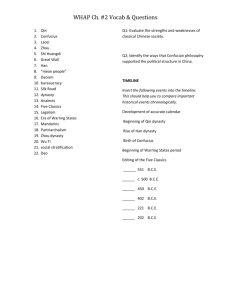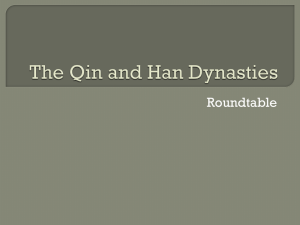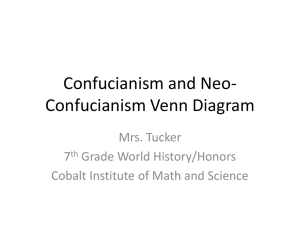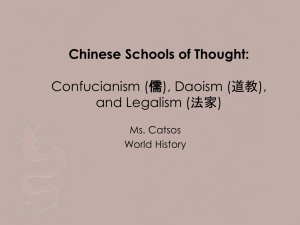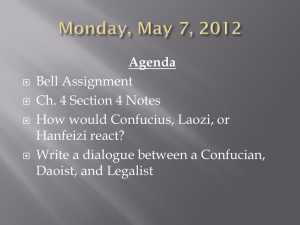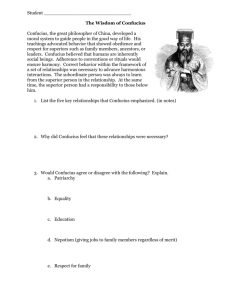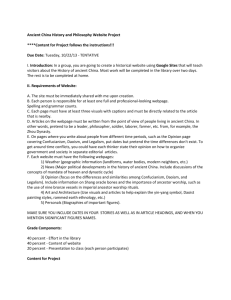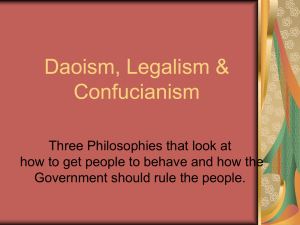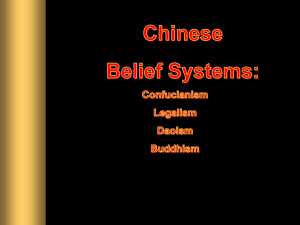File - Dr. Afxendiou`s Classes
advertisement
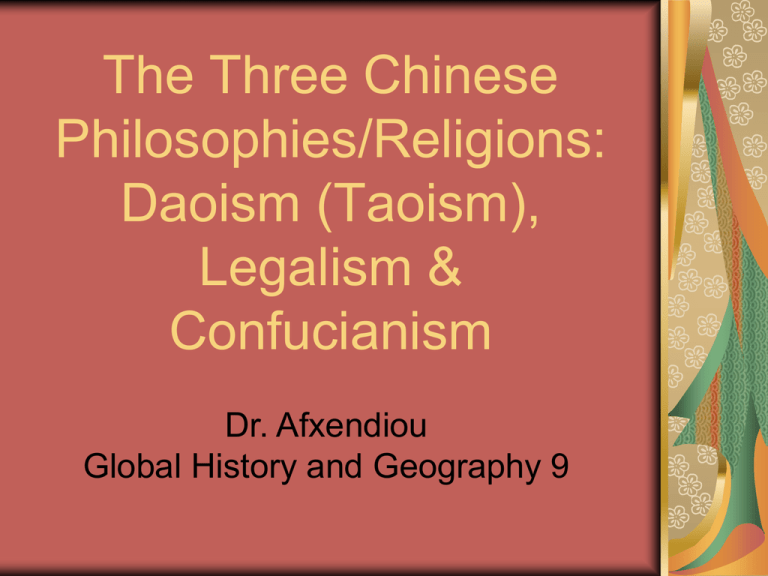
The Three Chinese Philosophies/Religions: Daoism (Taoism), Legalism & Confucianism Dr. Afxendiou Global History and Geography 9 Daoism/Taoism FOUNDER Started by a man named Laozi (Lao Tsu) who lived about 600 BC Lao Tsu believed that people needed to go with the flow (wu-wei), to let nature take its course GODS/DEITIES Most important are THE THREE PURE Manifestations of Laozi The Jade Emperor- the ruler of heaven and all levels of existence SACRED TEXT The Dao De Jing - The Classic in the Way and Its Power Not sacred but the most important text in the religion. It contains the teachings of Laozi KEY BELIEFS The DAO (TAO) - ‘The Way’ – it is the first-cause of the universe. It is a force that flows through all life. YIN AND YANG - everything in the universe has a life force of opposites Must keep the yin and the yang balanced Man is unhappy because he lives according to man-made laws, customs, and traditions that go against the ways of nature Feminine Passive Darkness Cold Weak Earth; Moon Masculine Active Light Warmth Strong Heaven; Sun Beliefs… Wrong for people to fight – go with the flow of nature Government is unnatural consequently, so are its rules and laws Social order does not exist as it is not natural, only order created by nature matters ULTIMATE GOAL to become one with Dao; one with nature. To escape the “social, political, & cultural traps” of life. Can only escape by: 1. Rejecting formal knowledge and learning. 2. Relying on the senses and instincts. 3. Discovering the nature and “rhythm” of the universe. 4. Ignoring political and social laws. MORAL LAW – 3 Jewels to be sought…. Compassion- awareness of another person’s pain and wanting to relieve it Moderation- avoid extremes Humility- modest, don’t brag EFFECTS ON SOCIETY POLITICAL Denied the validity of any government, thus Daoists did not believe in the emperor and did not support him. The government that governs least governs best Believed that rules of nature were more important than rules of government They were a subversive force EFFECTS ON SOCIETY SOCIAL People are part of nature. Any order imposed by society is unnatural. This undermined the social hierarchies of Chinese society and implied equality. Legalism You must first know… Not really a religion but a political philosophy We study it because it guided the behavior of the Chinese people It is AUTHORITARIAN - individuals should obey a powerful authority rather than exercise individual freedom FOUNDER Han Fei Zi GODS/DEITIES None ULTIMATE GOAL Maintain order in society To allow the ruler to stay in power PLACE OF WORSHIP None RELIGIOUS LEADERS None HOLY LAND None SACRED TEXT None Legal writings important MORAL LAW None Follow the laws set by the ruler who is the ultimate authority Key Beliefs All people are fundamentally flawed and that strict laws and harsh punishments are needed to keep them in order People should be responsible for other people’s actions. Neighbors and relatives should also be punished for not stopping the criminal act People should be scared into obeying laws A bit of history… Legalism was the dominant philosophy applied during the QIN DYNASTY Qin Shi Huangdi – applied strict rules and harsh punishments Did not allow any religions or philosophies to guide his subjects’ behavior other than his laws He persecuted Confucian scholars. He is known for burying them alive EFFECT ON SOCIETY POLITICAL Developed a very harsh system of government where rulers had absolute power and people had no rights at all SOCIAL People have no rights at all. Society is organized based on this principle. There is the absolute ruler, the aristocrats (his family, advisors, officials) and the rest Confucianism FOUNDER Confucius or Kong Fuzi – Master Kong Lived during Zhou Dynasty He felt that China was full of rude, dishonest people He wanted people to return to having good ethics GODS/DEITIES No supernatural power in the teachings of Confucius Confucius was made into a god over the years. His teachings were given religious aspects during the Han Dynasty. He never claimed to be anything other than a man looking to advise rulers ULTIMATE GOAL Create an ethical, orderly society PLACE OF WORSHIP Temples RELIGIOUS LEADERS None HOLY LAND None SACRED TEXT None Most important book The Analects. Contains the teachings of Confucius. Written by his students not himself. MORAL LAW Confucius established certain principles that were to guide peoples’ behavior KEY BELIEFS FILIAL PIETY – Respect your elders and your ancestors The emperor is the example of proper behavior and morals for society Fathers are role models for the family The 5 relationships The five relationships 1. Ruler Subject 2. Father Son 3. Husband Wife 4. Older Brother Younger Brother 5. Older Friend Younger Friend Confucius say… A man who has committed a mistake and doesn't correct it is committing another mistake. Our greatest glory is not in never falling, but in rising every time we fall. Real knowledge is to know the extent of one's ignorance. The superior man blames himself; the inferior man blames others. A bit of history… Adopted as the main governing philosophy during the Han Dynasty Became the foundation of the bureaucratic government the Han established Bureaucracy – a government run by government officials Bureaucrats trained in the Confucian classics and took civil service exams on their knowledge Scholar gentry – the educated class of bureaucrats Effect on society SOCIAL Created a code of proper conduct within the five relationships. By knowing what was expected of them in each relationship people knew how to behave so there was order and harmony in society. Effect on society POLITICAL Introduced the idea of educated civil servants who became part of Chinese bureaucracy. During the Han Dynasty civil servants had to take exams that tested them on their knowledge of the teachings of Confucius. These exams allowed only the smartest and hardest working people to become government workers making for a strong government.
